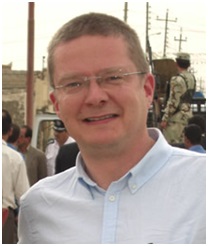- 25 Jul 2013
DAY 2 – IRAQ TEN YEARS AFTER: A RECKONING AND A BALANCE SHEET
Abstract:
This international two-day conference is an attempt to analyse the course of events in Iraq since the beginning of the US invasion in 2003. Participants have been asked to make a candid assessment of the history of the last ten years, and some have attempted to indicate likely developments in the short and medium term.
Three specialists have been invited from abroad; Toby Dodge of the London School of Economics has written first about the British mandate and subsequently about the post-2003 period. He has made several visits to Iraq, and has acted as an advisor, with ready access to some of the most senior Iraqi and non-Iraqi actors. Benjamin Isakhan, of Deakin University in Melbourne has recently published a book on democracy in Iraq in historical context. Charles Tripp, of the School of Oriental and African Studies in London has written what has become the standard history of modern Iraq, now in its 3rd edition.
Three members of the Middle East Institute here in Singapore have spent much of their lives working on Iraq, two as academics and one as a practitioner and an academic. Ali ‘Allawi, long in exile under the Ba‘th regime, was invited to be successively Minister of Trade, Minister of defence, and Minister of Finance, between 2003 and 2006, when he retired from politics. He has also written The Occupation of Iraq: Winning the War, Losing the Peace (Yale University Press, 2007); another book on Iraq, a biography of King Faysal I, is to be published towards the end of this year. Fanar Haddad is the author of Sectarianism In Iraq: Antagonistic Visions of Unity (Hurst, 2011, and is currently working on history and memory in the context of the events of the intifada in southern Iraq in 1991. Peter Sluglett has written, edited and co-authored several books on the modern history of Iraq. As the organisation of this workshop shows, his frequent attempts to escape further involvement in Iraqi historiography have not always been crowned with success.
On a more personal academic-genealogical level, Charles Tripp was Toby Dodge’s PhD supervisor; Peter Sluglett was Toby Dodge’s External PhD examiner, and Toby Dodge was Fanar Haddad’s External PhD examiner.
About the Speakers

TITLE : “EVERYTHING NEEDS TO CHANGE, SO EVERYTHING CAN STAY THE SAME” THE EVOLUTION OF THE IRAQI STATE: 1968-2003 AND 2003-2013
Toby Dodge
Deputy Director LSE IDEAS, London School of Economics
Dr. Toby Dodge is a Reader in the International Relations Department at the LSE, Deputy Director of LSE IDEAS and a Senior Consulting Fellow for the Middle East at the International Institute for Strategic Studies, London. He completed a PhD on the transformation of international system in the aftermath of the First World War and the creation of the Iraqi state at the School of Oriental and African Studies, University of London.
His most recent book is Iraq; from war to a new authoritarianism, (London: Routledge and the International Institute for Strategic Studies, 2012). Other books include, Inventing Iraq: the failure of nation building and a history denied, (2003). In addition he has published articles in The Washington Post, Le Monde Diplomatique, The Times, The Guardian, The Observer, and The Independent on Sunday.
Dr. Dodge research concentrates on the evolution of the post-colonial state in the international system. The main focus of this work on the developing world is the state in the Middle East, specifically Iraq.

TITLE : THE POLITICAL ECONOMY OF INSTITUTIONAL DECAY AND OFFICIAL CORRUPTION: THE CASE OF IRAQ
Ali Allawi
Visiting Research Professor
Middle East Institute, National University of Singapore
Former government minister in Iraq
Ali A. Allawi is a writer, biographer and former government minister in Iraq. He received his education at the Massachusetts Institute of Technology and at Harvard University. He served in the World Bank group for a number of years before founding his own investment firm. Following the changes in Iraq in 2003, he served as the Minister of Trade, and then the first civilian Minister of Defence. In 2005 he was elected to the Constituent Assembly of Iraq and then served as Minister of Finance. In 2007, he left public service to pursue scholarly and academic interests. He has authored four books including The Occupation of Iraq (Yale: 2007) and The Crisis of Islamic Civilisation (Yale: 2009). His book Faisal I of Iraq will be issued in September 2013 (Yale). It will be the first comprehensive biography of this seminal figure set against the formative years of the fall of the Ottoman Empire and the founding of the state system in the Middle East. At various times, Ali Allawi has been associated with Oxford University (Senior Associate Member); University of Exeter (Fellow); Princeton University (Fellow); and Harvard University (Fellow). He has made numerous media appearances, and his articles and essays have appeared in major international journals and newspapers. He is the recipient of several public policy and diplomacy awards, and his books have garnered prizes. He is currently working on a book on the economic history of the modern Arab/Islamic worlds.

TITLE: VIOLENT TRANSFORMATIONS: THE FUTURE OF COMMUNAL RELATIONS IN THE MIDDLE EAST SINCE 2003
Fanar Haddad
Post Doctoral Research Fellow
Middle East Institute, National University of Sinapgore
Fanar Haddad (BSc LSE, MPhil Cantab, DPhil Exon) previously lectured in modern Middle Eastern history at the University of Exeter and, most recently, at Queen Mary, University of London. Prior to obtaining his DPhil, Haddad was a Research Analyst at the Foreign and Commonwealth Office where he worked on North Africa. He has since published widely on issues relating to historic and contemporary Iraq. His main research topics are identity, historical memory, nationalism, communal conflict and minority politics. He is the author of Sectarianism in Iraq: Antagonistic Visions of Unity (London/New York: Hurst/Columbia University Press, 2011). His research at the MEI will focus on historical memory and narratives of state in the Middle East.
Event Details
Lee Kong Chian
School of Business Singapore Management University
50 Stamford Road Singapore 178899




